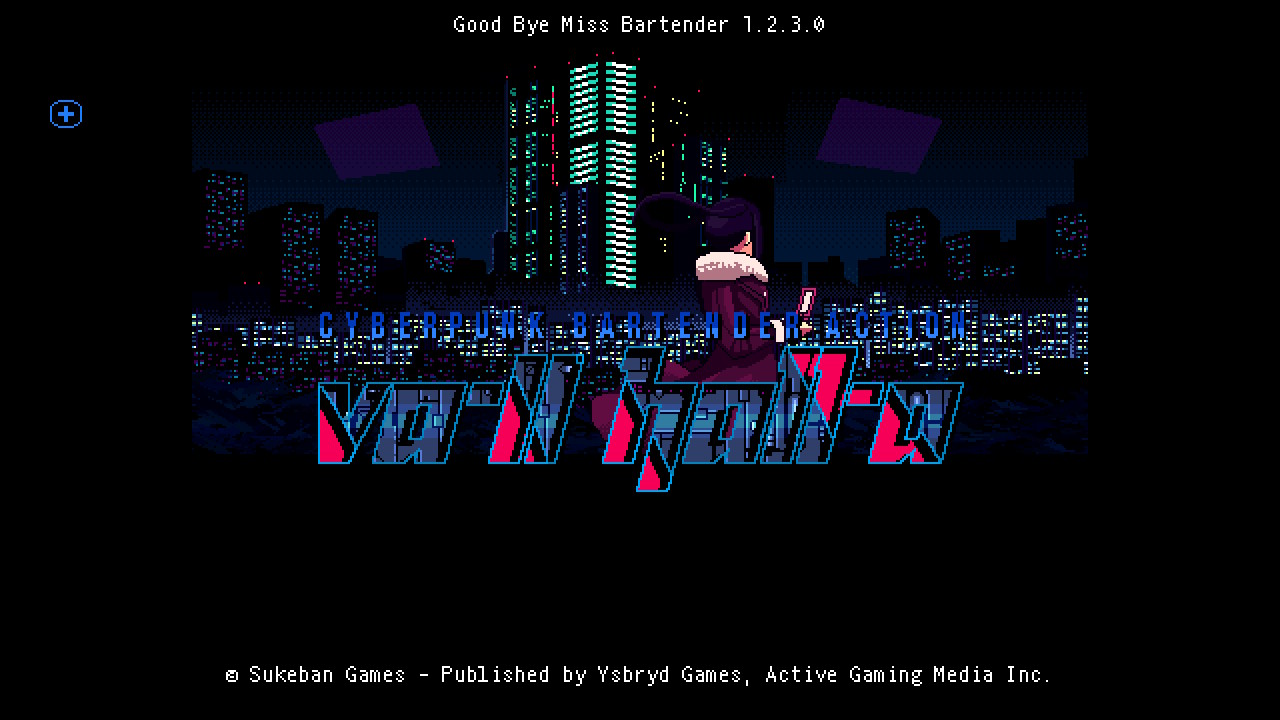[Review] VA-11 Hall-A: Cyberpunk Bartender Action – Nintendo Switch
VA-11 Hall-A:
Cyberpunk Bartender Action
Nintendo Switch
Developed By: Sukeban Games
Published By: Ysbryd Games
Category: Adventure, Simulation, Visual Novel
Release Date: 05.02.19
Sometimes a game comes out, and it’s an indie darling, and never is an unkind word written about it. Sometimes I play those games, hyped by everything I’ve seen, and I get let down that the promised ascension to nirvana never comes to pass. VA-11 Hall-A is one of those games for which I have seen no (credible) negative reviews –I mean, sure, there are some obvious trolls on Metacritic and Steam, but anyone whose opinion I actually respect has heaped universal adoration upon Sukeban Games’ tech-noir visual novel/bartending simulator. I can’t say I wasn’t intrigued by the concept myself; slinging drinks and helping people drown their sorrows in Blade Runner is a concept tailor-made to appeal to my most specific interests. While I didn’t quite achieve nirvana (because that’s the sequel), I did enjoy a personal, compelling, near-perfect narrative gaming experience. That’s close enough for now.
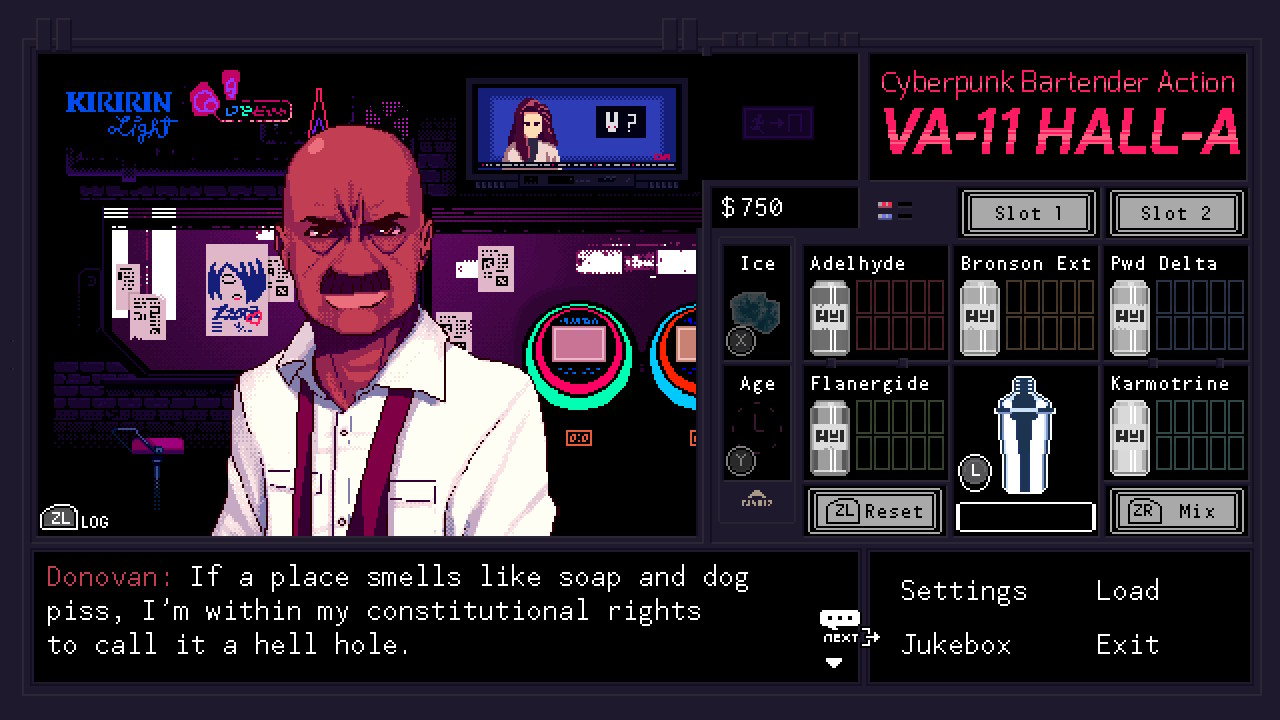
Dive Into This Bar
VA-11 Hall-A is at its core a visual novel; as such, it pretty much lives and dies by its story. VA-11 Hall-A will live on until Ragnarok. The year is 207X. The setting, Glitch City, a fascist dystopia run by ruthless corporate interests and their private police force, the White Knights. The protagonist is Jill, an acerbic twenty-something bartender reflecting on her life choices. She works the night shift at a bar designated VA-11 Hall-A, but the sign outside reads “Valhalla.” Every night a parade of regular patrons makes their way through, ordering drinks and talking through their troubles. Jill mixes drinks and shares what advice she can. Everyone is just trying to make it through one more day in a city rife with corruption, poverty, and violence.
VA-11 Hall-A adopts a very simple visual aesthetic. While character sprites are surprisingly emotive despite their minimalist, retro style, it is the game’s writing that carries the most narrative weight. VA-11 Hall-A’s ability to create multifaceted, compelling characters almost solely through dialogue is a testament to the strength of the game’s writing. I found myself deeply drawn into the lives of the conflicted search and rescue officer, a posh catgirl, the news website mogul, a really weird fetish guy, the enthusiastic sexbot, a news website intern, the pretentious, preposterous philosopher, and an unusually attractive hacker, among others. Jill’s combination of quick wit and genuine fondness for her clients comes through in every interaction, creating deep, satisfying relationships built around grounded, truly human stakes.
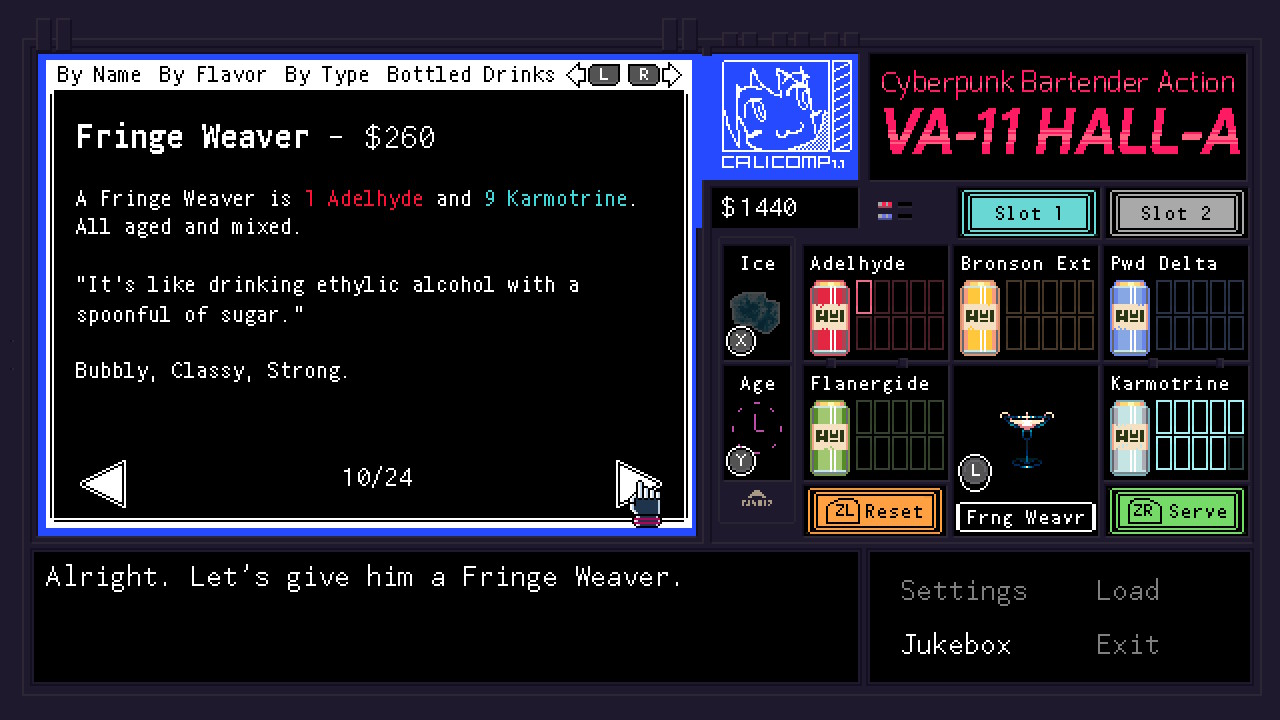
Glitch City: A Totally Fictional Place
VA-11 Hall-A’s setting turns as much into a character as the bar-going citizens who inhabit it. It has its own arc and personality that are troublingly familiar to too many people around the world. The White Knights run the streets at their whims. The city’s corporate ownership has little interest in checking their power, only covering up abuses through officially-sanctioned media outlets. Protests, riots, and their attendant casualties are a near-daily occurrence, throwing more fuel on the fire. Sukeban Games’ members mostly live in Venezuela, a country rocked by instability over the last few years. Sadly, their home has come to resemble Glitch City in sad and shocking ways. It was hard not to see the devs lives’ in the characters they created; it’s tough to admit your home isn’t what it could be. But it’s their home, and they love it anyway. It’s one more touch that gives VA-11 Hall-A such an earnest, human grounding.
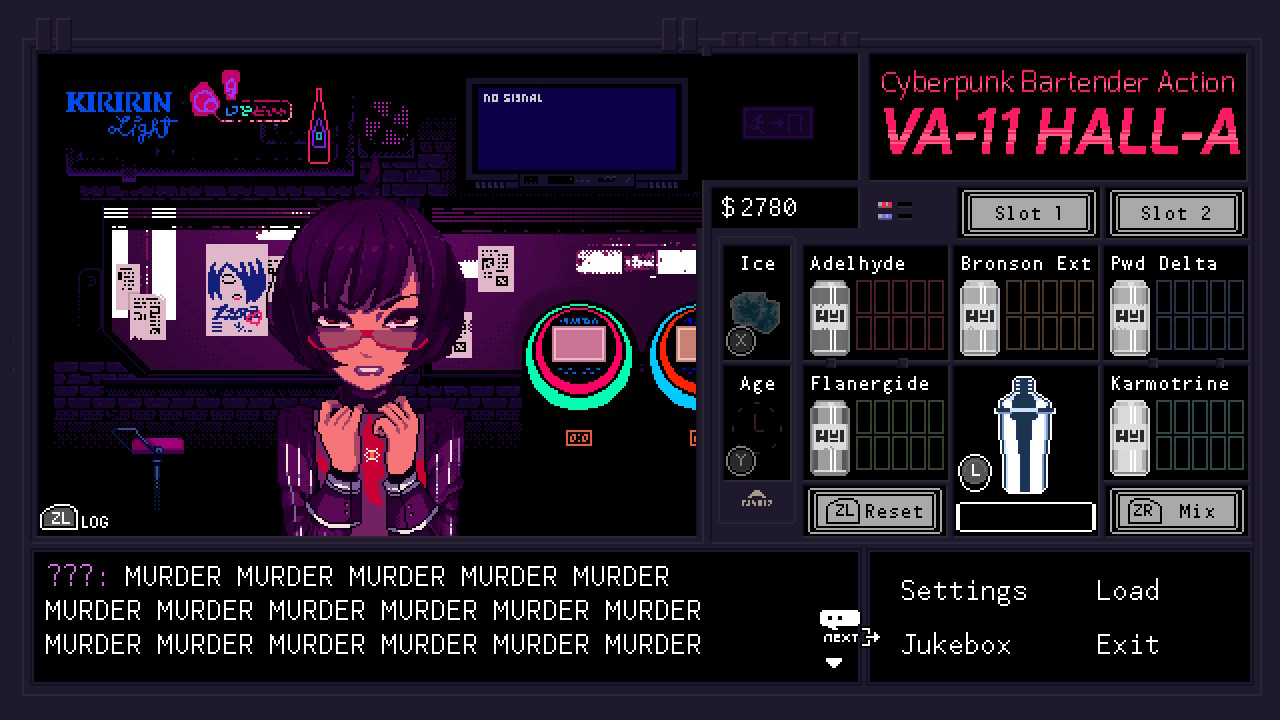
The Late Shift
The gameplay cycle is fairly simple. The game starts out in Valhalla, where Jill’s coworker Gil teaches her how to make drinks. It’s fairly simple; you have five ingredients, and a shaker that can take up to twenty shots of the different components. A customer will come in, order a drink, and Jill will mix it using her recipe book. You just have to combine all the ingredients and hit the mix button. Some drinks have to be aged or served with ice, and you have to add that to the ingredients before mixing. Mixing a drink is almost instantaneous, but if you mix for more than five seconds the drinks becomes blended. Some drinks require blending to be completed properly. Occasionally a client will order a big drink; you mix a big drink by doubling all of the ingredients. If you don’t get everything right the first try, you can hit a restart button to clear everything away and start again.
Customers don’t always know what kind of drink they want; sometimes they will ask for a certain type of flavor or feel for their order. That’s when it’s up to you, the bartender extraordinaire, to figure out what they want. Your recipe book can be sorted by type or flavor, so you have to use your brain to figure out what would be good. Sometimes a customer will make a weird request that the recipe book doesn’t cover; for instance a customer comes in and orders a drink inspired by an old friend. Earlier in the game, Jill and a customer were discussing the different drinks available at Valhalla and mentioned the bar’s manager had created the drink for an acquaintance. It’s a cool twist on the drink mixing mechanic that doesn’t tax your brain too much while reemphasizing the game’s focus on narrative.
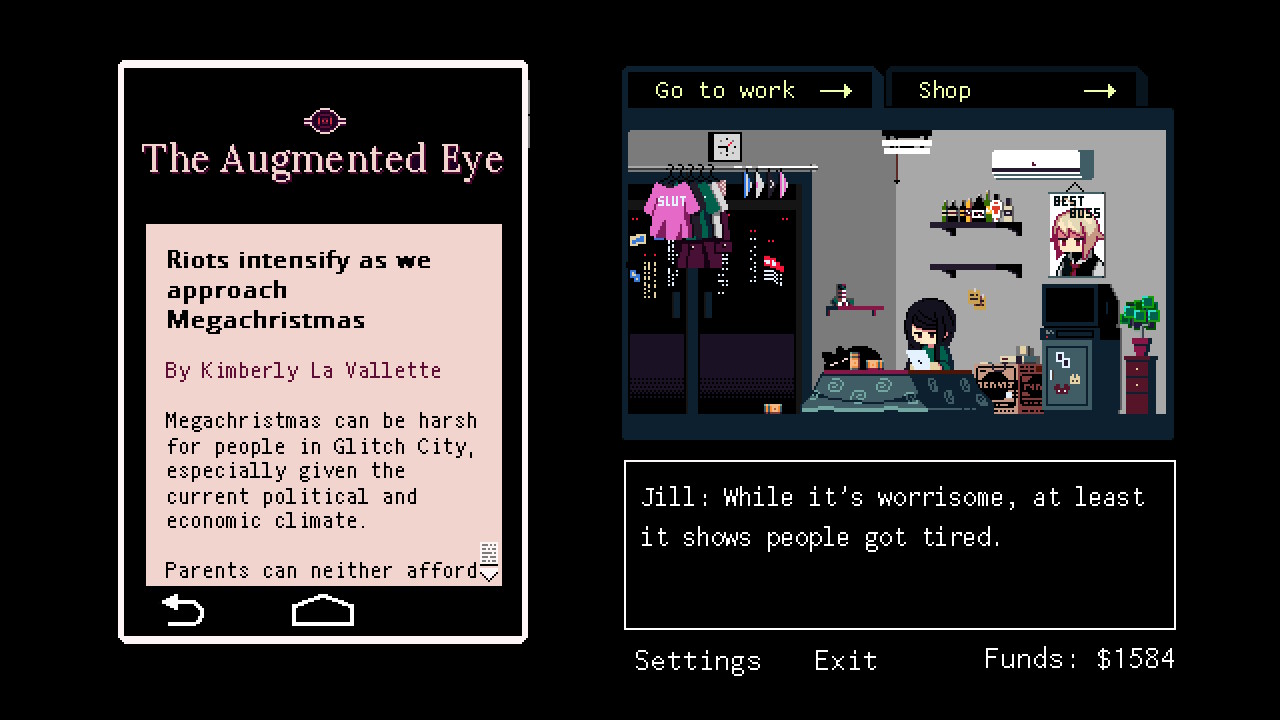
Of course, everyone pays for their drinks after they’ve ordered, and at the end of the night you get your salary, tips, and a little bonus if you got all of the drink orders correct. When your shift is over, there is a short interlude in Jill’s apartment where you can listen to the game’s soundtrack, check some message boards, read the news, and eventually buy some stuff to decorate said apartment. Whenever you start a new day, you get a message reminding you of which bill is due that week and maybe Jill will get an itch for an item she saw at the store. Buying the item will calm Jill down, letting her focus on work during her shift. The results of her getting distracted are fairly limited; Jill just forgets which drink a customer ordered once in a while, so their order doesn’t display on the bottom of the screen like it usually does. It’s not a problem as long as you were paying attention, though. If you limit yourself to just the stuff Jill wants and serve drinks correctly (and when given a choice of different drinks, always go with the pricier one! Upsell!), you should be able to pay all your bills on time and get the good ending no problem. Oh, yeah; there are multiple endings, so we’ve got some good replay value here, too.
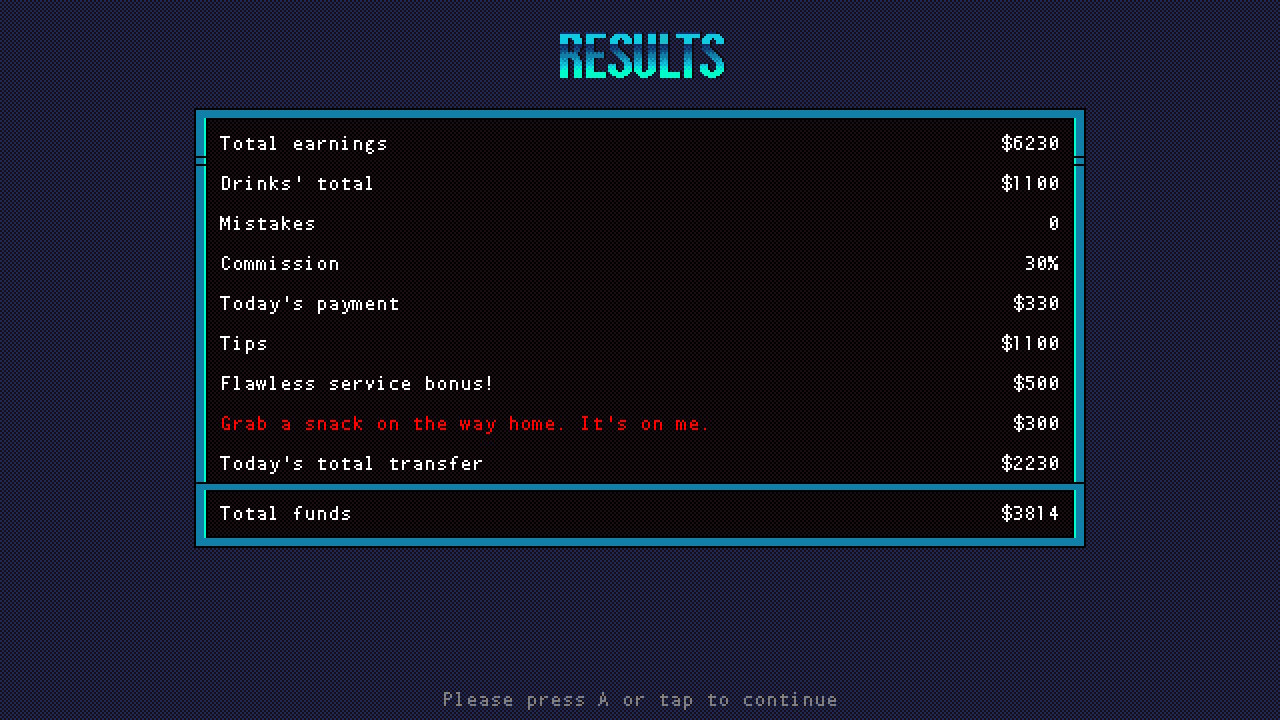
Decaying Décor
VA-11 Hall-A features some awesome old-school graphics. Its aesthetic is heavily inspired by the PC-98 computer, a favorite of Japan known for popular visual novel adventures, and anime, also a favorite of Japan known for its distinctive art style. The graphics are fairly simple, relying on just a few different character portraits that somehow successfully convey the entire range of human emotion. Each character conveys a sense of life, even though they don’t possess any motion. Valhalla itself is wonderfully rendered mostly in black, which helps to perfectly set the mood for a dimly lit dive bar. Small visual details like adding the items Jill buys to her apartment show a level of care by the devs that permeates the whole experience, underscoring the game’s personal themes.
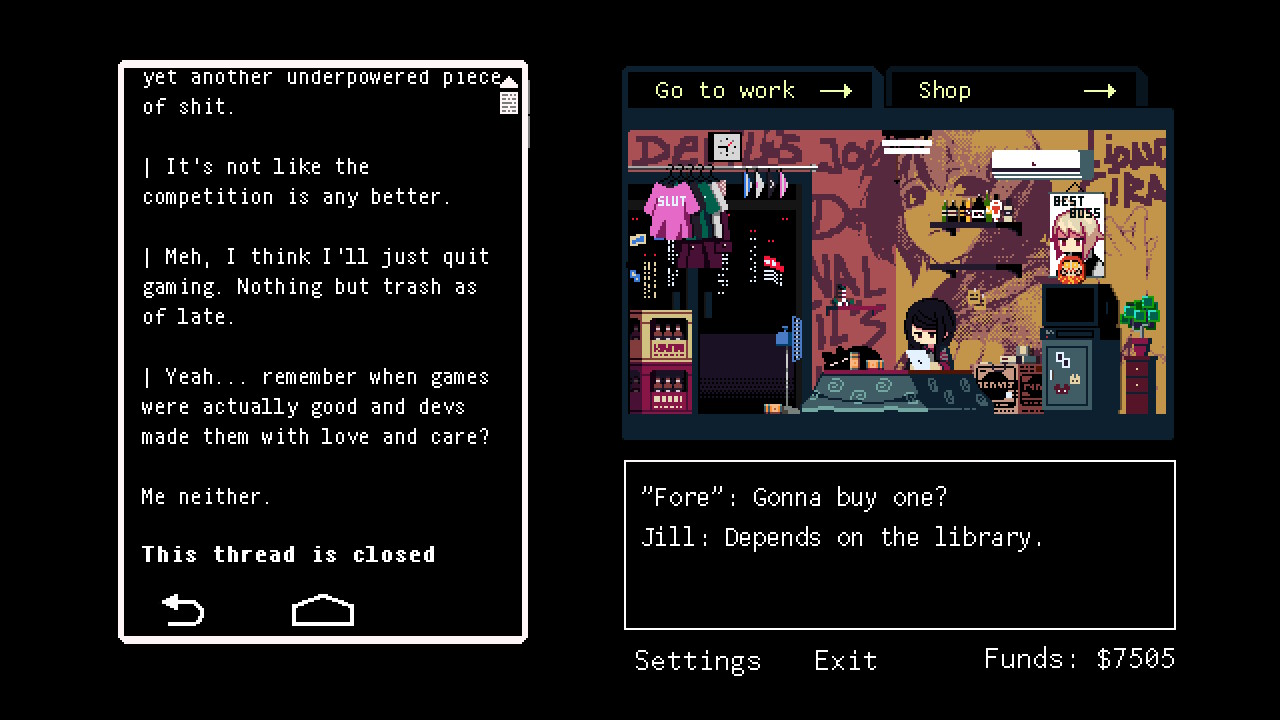
P1AY-1T 5AM
The soundtrack is sublime. Michael “Garoad” Kelly composes a masterful electronic arrangement. I could just sit and listen to the music in Jill’s apartment between shifts forever. The game goes out of its way to showcase its soundtrack with a cool jukebox mechanic at the bar. Every night, Jill has to set the playlist for the bar before her shift. I spent more time than the devs probably intended going through every track available to me (more are unlocked by progressing through the game and by buying certain items) every night to set the bar’s mood to match Jill’s. Picking a favorite song is like picking a favorite child (I assume; I don’t have kids). Although I will say that every time I hear “Everything Will Be Okay,” I think it just might be.
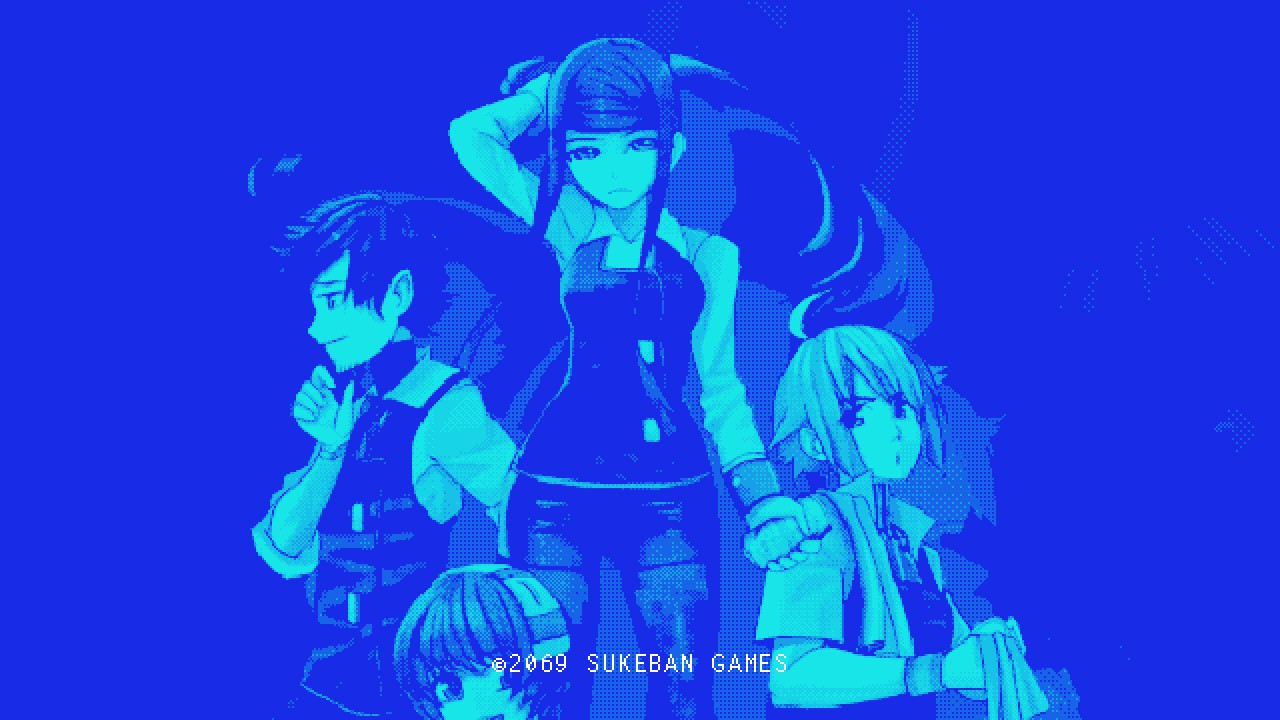
Playability
VA-11 Hall-A doesn’t use any motion controls, but you can use the Switch’s touchscreen if you prefer playing undocked. Personally, I preferred playing the game on my TV for two reasons. One, I have a great surround system and the soundtrack is INCREDIBLE. Two, and this is maybe my only complaint about the game, the text is a little small on the Switch’s screen. The touch controls aren’t significantly easier to use than the Joycons or a Pro controller, although they are a little, I suppose. Still, I recommend playing this game on a system that gets you the best possible sound quality.
TL;DR: I regret that my words cannot possibly do justice to the amazing experience I had playing this game.





Buy VA-11 Hall-A: Cyberpunk Bartender Action
$14.99
Follow Sukeban Games
Follow Ysbryd Games


